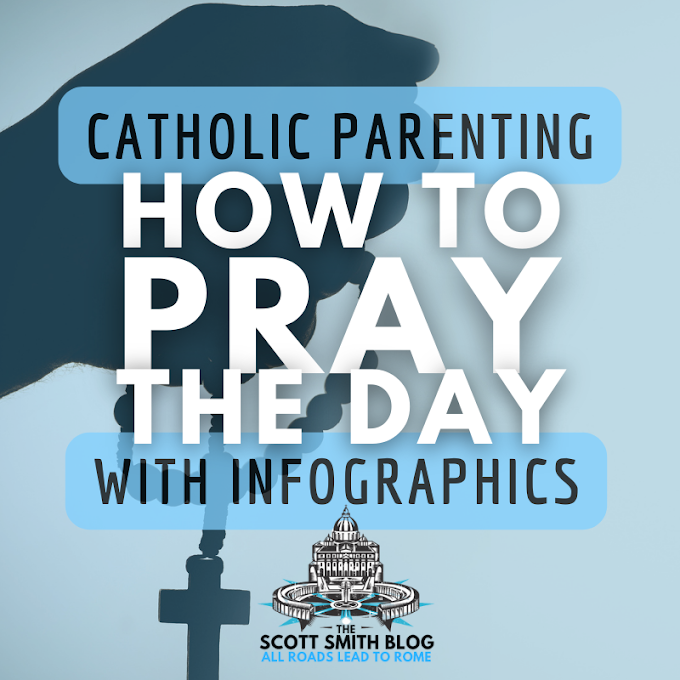Today is the feast day of St. Irenaeus of Lyons, one of the greatest minds of the Early Church, if not the greatest.
You can find basically all of the Church's essential doctrines in sapling form in the writings of Saint Irenaeus. His writings are critical for defending the Church's teachings on the Eucharist, the Virgin Mother, the canon of Scripture, and more.
Here are the FIVE key things you need to know about St. Irenaeus, plus some of the best St. Irenaeus' quotes:
The consequences of this simple connection are enormous. Just think what it proves about Mary! How was Eve conceived? She was conceived immaculately, without any stain of sin, and born virginally from the side of Adam. There you have a basis for the Immaculate Conception. Also, in terms of recapitulation, Eve was born virginally from Adam, so the Second Adam was born virginally of the Second Eve. There you have a basis for the Virgin Birth.
St. Irenaeus also said the following regarding the parallel lives of Eve and Mary, the New Eve:
There's still more! For more on how Mary is the New Eve, check out this post on the Wedding at Cana and this post on the prophesy of the Immaculate Conception in the Proto-evangelium in Genesis.
You can find basically all of the Church's essential doctrines in sapling form in the writings of Saint Irenaeus. His writings are critical for defending the Church's teachings on the Eucharist, the Virgin Mother, the canon of Scripture, and more.
Here are the FIVE key things you need to know about St. Irenaeus, plus some of the best St. Irenaeus' quotes:
1. Mary is the New Eve
St. Paul talks about Jesus being the "Second Adam" or "New Adam," but it's St. Irenaeus who completes the comparison.
Here is St. Irenaeus' quote on Mary, the New Eve:
 |
| St. Irenaeus of Lyons, from Against Heresies, Book III, Chapter 2, paragraph 4. |
St. Irenaeus also said the following regarding the parallel lives of Eve and Mary, the New Eve:
As Eve was seduced by the word of an angel and so fled from God after disobeying his word, Mary in her turn was given the good news by the word of an angel, and bore God in obedience to his word. As Eve was seduced into disobedience to God, so Mary was persuaded into obedience to God; thus the Virgin Mary became the advocate of the virgin Eve.
There's still more! For more on how Mary is the New Eve, check out this post on the Wedding at Cana and this post on the prophesy of the Immaculate Conception in the Proto-evangelium in Genesis.
2. St. Irenaeus "The Father of Catholic Theology"
Saint Irenaeus has perhaps the greatest apostolic pedigree of any Church Father, apart from the Popes. He was the student of St. Polycarp, who was the student of St. John the Apostle. Because of this, Irenaeus serves as the bridge between the Apostolic and Patristic periods of Church history.
The Church was hammered by heresies in the Second Century, and St. Irenaeus of Lyons hammered back. He dealt mortal blows to both Gnosticism and Marcionism. The systematic and methodical manner in which he destroyed the arguments of the heretics is why he is sometimes called "The father of Catholic theology." Not only was Irenaeus the greatest theologian of the Second Century, he was one of the greatest anti-heretical writers ever.
3. St. Irenaeus and Divinization
God became man so that men might be restored to their godliness. This is the process of "Divinization." NOTE: This is divinization, not divination, which is prohibited practice akin to witchcraft.
But it's more than just "godliness," as in "cleanliness is next to godliness." God became man so that men could become divine.
Here is St. Irenaeus' quote on men becoming divine:
 | |
|
Here is another St. Irenaeus quote, describing the role of the Incarnation of Jesus in divinization:
The process of divinization is how man takes on the full stature of humanity. This leads to another well-known St. Irenaeus quote:
4. St. Irenaeus and The Eucharist
This process of divinization occurs through the Sacraments, especially the Eucharist. Adam and Eve ate of the forbidden fruit and fell. Also, by an act of eating, we will rise again:
As St. Irenaeus states above, our bodies are “no longer corruptible” because we have received the Eucharist. Jesus’ own body becomes for us the Tree of Life.
St. Ignatius of Antioch, another amazing Church Father who was martyred in the Circus Maximus not long before Irenaeus was born, called the Eucharist the “medicine of immortality.”
St. Irenaeus also states above that, having eaten of the Eucharist, we have “the hope of the Resurrection.” It is through the living power of the Eucharist that we are resurrected, instead of suffering “corruption” and decay.
By eating of the Eucharist, the Body of Christ, our own bodies are joined to Him who said “I am the Resurrection and the Life.” We will resurrect because Christ resurrected, because our bodies become His Body, and this is accomplished by eating the Eucharist.
That's not all, check out this article on the hidden reference to the Eucharist in the Lord's Prayer.
5. St. Irenaeus and the Authorship of John's Gospel
It seems odd to write that the author of John’s Gospel isn’t John. It’s like asking, who’s buried in Grant’s tomb? Nevertheless, the authenticity of John’s Gospel has recently come under some harsh scrutiny.
Though never seriously questioned for eighteen centuries, it has become increasingly popular to claim that John the Apostle was not the author of John’s Gospel. This is primarily because John put the divinity of Jesus at the center of his narrative. Even worse, some critics reject John as the author of his gospel because, if the Apostle had actually written it in his lifetime, it would mean Jesus actually prophesied future events. How crazy is that? God, the omniscient one, actually being omniscient. God forbid!
Now, remember, Saint Irenaeus was taught by Saint Polycarp, who was himself a disciple of the Apostle John. Saint Irenaeus is, therefore, a direct link to the Apostle John. Saint Irenaeus also cites to John’s Gospel at least a hundred times in just his extant writings.
When Saint Irenaeus refers to John’s Gospel he leaves no room for doubt as to authorship. For example, in Against Heresies, he states "Later John, the disciple of the Lord who rested on His breast, also wrote a Gospel, while he was residing at Ephesus in Asia" (Adv. Haer., III, i, n. 2). Not only does Irenaeus explicitly refer to the disciple John as the author of a Gospel, but the John who “who rested on [the Lord’s] breast.” This is referring, of course, to John 13:23,“One of his disciples, whom Jesus loved, was lying close to the breast of Jesus.”
Modern critics, separated by nearly two millennia from the events and authors of the Gospels, may question Gospel authorship, but early witnesses, such as Irenaeus, do not. This should be very instructive to us.
I hope you enjoyed learning about Saint Irenaeus! If you would like to learn more about this great saint and great mind, check out the following infographic or all these places in the Catechism that cite to Saint Irenaeus: Paragraphs 53 "God Reveals His 'Plan of Loving Goodness'", 172-173, 460, 518 (on "recapitulation"); 704 (the Holy Spirit in creation); 1730 "Man's Freedom."
Saint Irenaeus of Lyons, pray for us!

















3 Comments